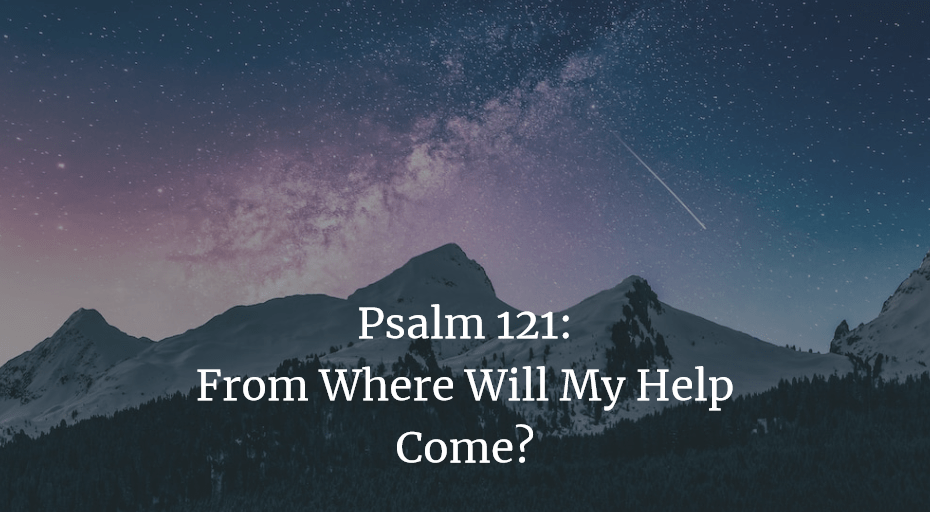Where does your help come from?
This is the question begged in the New International Version’s rendering of Psalm 121:1. Odds are, it won’t take you long to formulate an answer to this question. You answer may be, much like the following verse, “my help comes from God.” That’s it. That’s the end of the story, you could say.
Where will your help come from?
This is how the Complete Jewish Bible translates the same question posed in Psalm 121:1. Notice a difference? The question is not a matter of where your help surely comes from, but from where will it? Will your help come at all? Will your help come from God? Will it come from the church? Will it?
Readers of the Bible in the 21st Century take this verse as a hopeful assurance that God is their help. There may be nothing wrong with this, but we need to keep in mind the same thing I address in every post: the Scriptures we read were written in a different time, under specific circumstances, and for specific audiences. The Psalmist did not simply decide to pen a few sweet words to remind him of his faith in God.
An important question to ask in biblical exegesis is this: where is the author at when crafting these words? I do not mean geographical location. I am not concerned with which mountain the psalmist has set his eyes upon. Where is he at spiritually? In many of the psalms, the writers are not in desirable states. They may write beautiful words and ideas about who God is, but they do this as they are walking in darkness you and I can hardly fathom.
For the record, we have no idea who wrote this Psalm. There is no mention of an author or geographical location, and what we do find of such in the text is ambiguous. It is widely believed that the psalmist is referring to Mount Zion, being the mountain where God resides in the Old Testament, but this is not definitive.1 What we do know is that the psalmist “is full of ardent longing yet fearful of the dangerous journey” that lies ahead.2
So what purpose, then, does this psalm serve? According to one commentator, “Psalm 121 is about individual human life, always threatened, and the promise of Yhwh’s all-encompassing protection.”3 Our lives on earth are characterized by suffering. Indeed, I might argue, our lives are engulfed in suffering. Each day is a journey in which we gaze upon the mountains and ask, “From where will my help come?”
I would also like to address the symbolism in this passage. What do you think the psalmist means by “mountains?” Are they referring to physical mountains? Are they looking to the greatest heights on the earth and questioning if their help is greater than the grandeur before them? Maybe so. But commentators offer some different suggestions.
Firstly, the mountains may represent the difficulties we face in life. The mountain may be the mountain of grief, the mountain of pain, the mountain of loneliness, etc. Under this interpretation, “Verse 1 would then be a very concrete expression of concern and anxiety.”4 It is certainly a debatable point, but often what causes anxiety is not where we have come from, but where we are headed. Will God meet us at the peak of the mountain? Or will we find ourselves alone?
Another interpretation suggests that the mountains may represent various sources of help. I personally find this interpretation more fitting within the psalm’s context. It was written in a time and place where if you did not believe in one God, you believed in multiple gods. One mountain may represent Zeus, the other Astarte. Similarly, in a modern reading, one may represent the church, another the government. Will our help come from one of these?
The psalmist answers that question, “No.” There is one source of strength. There is one source of help in times of distress. It is not one mountain; it is not any of the mountains. That help, he proclaims, is “Adonai, the maker of heaven and earth” (121:2). His help comes not from the mountains; it comes from the maker of the mountains.
Personal Reflection
Recently, I found myself in a place comparable with that of the psalmist. I asked from where my help will come. I believed my help would come from those close to me. When that failed, I believed my help would come from what I do. That failed. I believed it would come from within. More than the previous, that failed and it hurt when it did.
Where does my help come from? Where will it come from? As I mentioned in my previous post, I found myself at the bottom—again. When you find yourself at the lowest depths imaginable, you can no longer look down. There is nothing there. It forces you to look up. Not to look up to the mountains, but to look beyond them. Beyond what our eyes can see. That, I believe, is where our help will come from.
1. Adamo, David T. and Bukola Olusegun. “The Assurance that Yahweh can and Will Keep His Own: An Exegesis of Psalm 121:1-8.” Theologia Viatorum (Sorenga) 46, no. 1 (2022), 2.
2. Ibid.
3. Hossfeld, Frank-Lothar, Erich Zenger, Linda M. Maloney, and Klaus Baltzer. Psalms 3: a Commentary on Psalms 101-150. Minneapolis, MN: Fortress Press, 2011, 320.
4. Ibid., 321.
